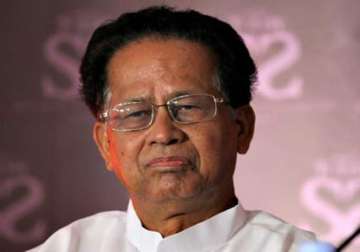Market economy will benefit Gujarat but harm Assam: Tarun Gogoi
New Delhi: Assam Chief Minister Tarun Gogoi today rued that Prime Minister Narendra Modi's stress on shifting from plan to market economy will benefit big industrial states like Gujarat but harm small and backward states
New Delhi: Assam Chief Minister Tarun Gogoi today rued that Prime Minister Narendra Modi's stress on shifting from plan to market economy will benefit big industrial states like Gujarat but harm small and backward states like Assam.
At a meeting of NITI Aayog—the new institution which has replaced the Planning Commission, he said in such a situation, unemployment problems will grow manifold in states like Assam.
On the Prime Minister's stress on shifting from plan to market economy, he said, “Thereby actually we will go away from the Preamble of democratic socialism. This will benefit the industrially developed states like Maharastra and Gujarat.”
Gogoi said it is imperative that the relatively backward states should be first brought up to match the level of the comparatively developed states.
“I also strongly feel that our development agenda should include all communities, giving special thrust and emphasis on those which require special focus and attention,” he said.
The Chief Minister said since the NITI Aayog has come into existence in place of Planning Commission, it should be used in the best interests of the country to bring about a balanced development ensuring that various stakeholders benefit from its knowledge, resources, expertise and advice.
“Today, in the first meeting of Governing Council, we should resolve that the NITI Aayog shall study various social and growth parameters of all states and draw up a special plan and programme for those states where key indicators of development are below the national average,” he said.
Gogoi said Assam is gradually in the path of progress but needs continued support and further financial assistance for the implementation of special schemes for the state.
He said India is a country with huge inter-regional and inter-state disparities and the only way to close these gaps is through a planned process of public investment to address human and social development requirements, as also in economic infrastructure of all kinds.
“It is here that the role of a planning body, whether Planning Commission or NITI Aayog is crucial,” he said.
Gogoi said the Governing Council should also have the role of monitoring and supervision of implementation of its policies and there should be at least two of its sittings in a year.
“There should also be a regular interface between officials and domain experts of NITI Aayog and the officials of the states, which would result in better understanding of each other's constraints and competencies.
“Besides, the NITI Aayog should be mandated to build capacities in the states in various sectors and activities so as to facilitate new ways of financing and implementing projects, introducing new technologies,” he said.
He said there should be greater clarity on the ongoing planning process, especially implementation of the agreed plans and programmes for the current Five-Year Plan.
“In my view, there is considerable advantage in continuing the five-year plan cycle in the future as this has been well established and accepted in all the states as an important modality in the development process,” he said. The Chief Minister said in any case, planned public investment will have to be done with reference to a time period to ensure measurable results and accountability.
“I think that five years is a sufficiently long enough time for such assessment. At the same time, I would agree that there is a case for introducing a strategic or longer term perspective plan covering a period of 10-20 years, or even longer, which could reflect broader vision and aspirations,” he said.
Gogoi also criticised the central government for delayed circulation of agenda paper and said it made difficult for the state governments to prepare within a short span of time.
